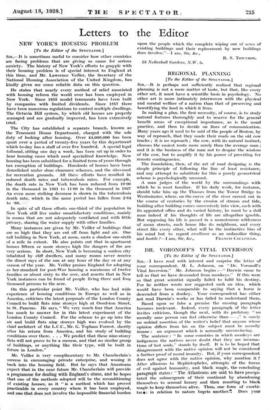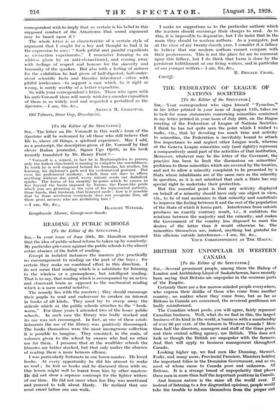DR. VORONOFF'S VITAL INVERSION • [To the Edikr of the
SPECTATOR.]
have read with interest and surprise the letter of your correspondent, M. L. Johnson, on "Dr. Voronoff's Vital Inversion." Mr. Johnson begins :—" Darwin came to tell us that we have descended from monkeys." If this were so that great scientist signally failed to fulfil his destiny. For he neither wrote nor suggested such an idea, which would have been comparable to saying that a horse is descended from a donkey. Your correspondent has either not read Darwin's works or has failed to understand them.
Based upon so false a premise the ensuing paragraph becomes irrelevant. Indeed, every paragraph of the letter invites criticism, though the next, with its prefatory "no morally sane person can feel otherwise than—," is surely an unkind assertion of the writer's belief that anyone whose opinion differs from his on the subject must be morally insane : an argument which is naturally unconvincing. The sentence : "In some countries in which monkeys are indigenous the natives never doubt that they are incarna- tions of lost souls," stands by itself. It is to be hoped that disagreement with the native opinion will not be considered a further proof of moral insanity. But, if your correspondent does not agree with the native opinion, why mention it ? After allusions to Mephistopheles, attempts of the forces of evil against humanity, and black magic, the concluding paragraph states "The Atlanteans are said to lave precipi- tated the submergen& of 'their continent by abandoning themselves to sensual luxury and then resorting to black magic to keep themselves alive. Thus, one form of exorbi- taii3 in relation to nature begets another"! Does your
correspondent wish to imply that so certain is his belief in this supposed conduct of the Atlanteans that sound argument may be based upon it ?
The whole letter is so characteristic of a certain style of argument that I sought for a key and thought to find it in the expression he uses : "Such pitiful and painful expedients as vivisection experiments." I remember listening to in aildress given 14. an anti-vivisectionist, and coming away with feelings of respect and honour for the sincerity and humanity of the speaker. But also with a feeling of sadness for the exhibition he had given of half-digested, half-under- stood scientific facts and theories introduced--often with pitiful irrelevance—to support a case which, be it right or wrong, is surely worthy of a better exposition.
So with your correspondent's letter. Those who agree with his anti-Voronoff ideas will surely wish for a sounder exposition of them in so widely read and respected a periodical as the Spectator.—I am, Sir, &c.,
ARTLIUR M. CROSFIFLD.
Old Tolmers, Stone Gap, Broadstairs.

































 Previous page
Previous page